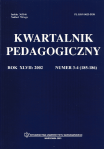Cultural conformity within Vygotsky's paradigm for education: a critique from the perspective of early Heidegger
Cultural conformity within Vygotsky's paradigm for education: a critique from the perspective of early Heidegger
Author(s): Paul Downes Subject(s): Education
Published by: Wydawnictwa Uniwersytetu Warszawskiego
Keywords: postmodern pragmatism; existential anxiety; authenticity; introverted experience; constructivist choice; primordial experience
Summary/Abstract: Vygotsky’s sociocultural framework for intellectual development is gaining increasing empirical support and is highly influential and appropriate for many contexts of education. Yet further interrogation is required of its limitations. It is argued to share many features with postmodern conceptions of truth, as Vygotsky’s structures of cognition are socially constructed, pragmatic products of historical, cultural forces in a given society that are internalised by the individual. This article argues that early Heidegger’s conception of the inauthentic ‘They’ self, to be contrasted with an authentic self, provides an avenue for critique of Vygotskyan approaches, as leading to cultural conformity in education. A domain of silent, private, and what Heidegger would term primordial, experience may be filtered out from relevance in an educational system where a Vygotskyan framework predominates. The importance of providing educational resources to develop a capacity in the individual to engage with solitude and existential anxiety is that these qualities can provide a protective factor against the crushing conformity of cultural pressure that is frequently detrimental to the individual’s well-being.
Journal: Kwartalnik Pedagogiczny
- Issue Year: 216/2009
- Issue No: 2
- Page Range: 97-116
- Page Count: 21
- Language: English
- Content File-PDF

